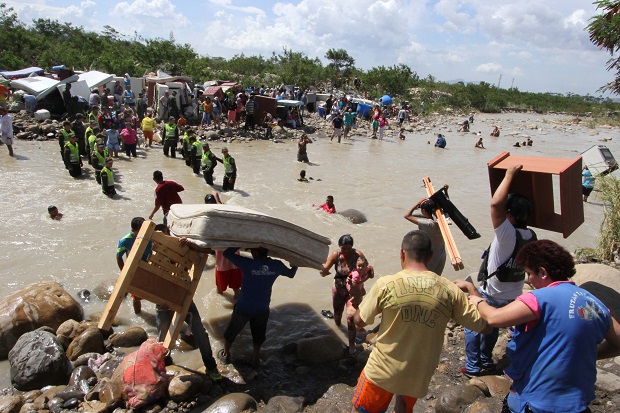
People carry their household belongings across the Tachira River from Venezuela, foreground, to Colombia, near San Antonio del Tachira, Venezuela, Tuesday, Aug. 25, 2015, during a mass exodus of Colombians living on the Venezuelan side of the border. Venezuelan President Nicolas Maduro vowed to extend a crackdown on illegal migrants from neighboring Colombia whom he blames for rampant crime and widespread shortages, while authorities across the border struggled to attend to droves of returning deportees. AP Photo
CARACAS, Venezuela—Venezuela bolstered its military presence and started taking a census Monday in towns along the border with Colombia as part of a diplomatic spat that has seen more than 1,000 Colombians deported.
The countries have been locked in a row since Venezuelan President Nicolas Maduro closed part of the border this month after unidentified assailants attacked a Venezuelan anti-smuggling patrol, wounding three soldiers and a civilian.
Maduro blamed the attack on right-wing paramilitaries from Colombia.
He has accused the neighboring country of waging an attack on Venezuela’s economy—a reference to the rampant smuggling of heavily subsidized food and other goods out of Venezuela, where more than five million Colombians live.
In the aftermath of the armed attack, Venezuela deported more than 1,100 Colombian nationals, prompting over 10,000 others to flee to avoid being sent home without their families or belongings.
A first contingent of 180 troops arrived in Tachira state Monday, near the Colombian border, in Air Force jets.
They are part of the 3,000 troops Maduro has ordered to be deployed in the area including the towns of Ayacucho, Garcia de Hevia, Lobatera and Panamericano.
The census is being undertaken in six of 10 border towns in Tachira state that are under a state of emergency decreed August 21 by the president.
The census will take a tally of people, homes, commercial and industrial properties, public services and economic and farming activity, the official Venezuelan government gazette said.
The state of emergency bars people from carrying guns and holding public meetings that do not have prior authorization. It also allows raids of homes and telephone wiretaps without a court order.
The crisis deepened on Thursday, when the two countries recalled their ambassadors.
The porous, 2,200-kilometer (1,400-mile) border they share has long been rife with guerrillas from the Revolutionary Armed Forces of Colombia and National Liberation Army, as well as drug gangs and smugglers.
The Colombian gangs include the remnants of right-wing paramilitary groups that once fought the guerrillas but were disbanded a decade ago.
Maduro blames Colombian smuggling for severe shortages of basic goods in Venezuela, a problem that fueled violent protests in the country last year.
Venezuela has long used its oil wealth to fund price controls that keep goods like rice and toilet paper at as little as a tenth of the price they command in Colombia.
But it is also in the grips of crippling shortages, now exacerbated by tumbling oil prices.
RELATED STORIES
Venezuela, Colombia vow more cooperation in border dispute
Colombians flee Venezuela after mass deportations